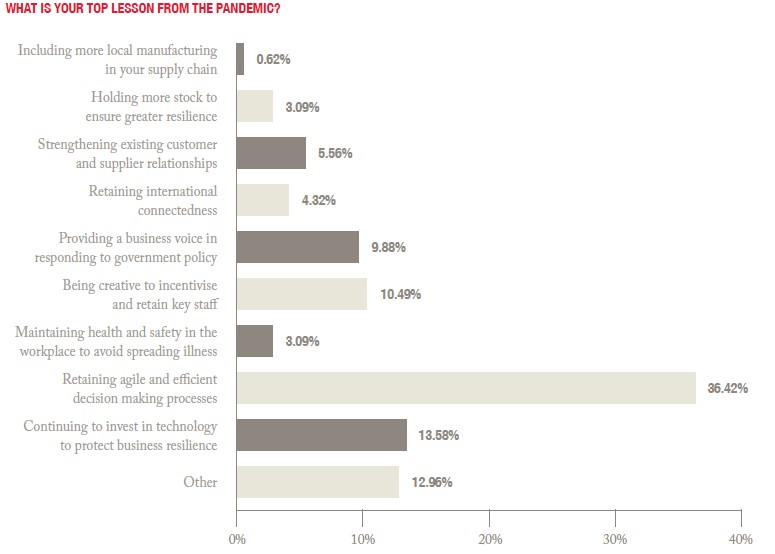“Covid is a perfect example of how we can never assume the status quo will continue. It’s the same in business. To stay ahead, we must always be searching for ways to evolve and improve.” So said noted business author Simon Sinek in the depths of the pandemic last year.
Organisations the length and breadth of New Zealand have been taking the opportunity to identify lessons from their own pandemic experience, seeking insights that will drive future growth and power organisational success. To contribute, MEttle provides insights from two core sources: a survey of New Zealand directors and C-suite executives, plus a series of comments from business leaders, to identify what lessons have been useful and created positive impacts.
168 organisations responded to our simple, one-question survey to share their top lesson that has or will change their organisation in the coming years.
Top lesson from the pandemic
The number one most-valued lesson for businesses to emerge from our survey is retaining agility and efficiency of decision-making process with 36.42% of respondents being clear that agility and efficiency is an absolute priority. This sentiment is supported by organisations across New Zealand and around the globe as the pace of change accelerates beyond anything we could have previously imagined.
The second lesson to emerge from the survey was continuing to invest in technology to protect business resilience (13.58%). Technology has played an integral role in how many businesses reacted to and continue to support staff and customers during the last two years. The importance of technology is seen as a critical investment by many.
Surprisingly, at the other end of the response scale, given the disruption of supply chain impacting global markets, was that including more local manufacturing in your supply chain elicited only a 0.62% response.
Lessons for the future
To complement the survey, MEttle sought opinions from leaders of major organisations across New Zealand’s business landscape on the insights from the pandemic that they will hold onto for future use. Following are excerpts from the various chairs and chief executives viewpoints:

Ross Taylor
CEO, Fletcher Building
“It highlighted how much you can get done in a short period of time in a big organisation with alignment. Everyone understood the need clearly and that we had to deliver outcomes at pace. The focus, cut-through and implementation was amazing. The fast changes we were able to make on costs, operational disciplines, pay frameworks, work flexibility etc. at a macro and micro level were astonishing. In a normal paradigm these would have been subject to frameworks and processes taking much longer and with likely a mediocre success rate.
“Now, on the right issues and opportunities, my approach is to up the ante on getting key things done in a similar fashion. It’s not going to be ideal for everything but in some cases I would approach this in a higher energy and intense fashion.”
James Miller
Chair, Channel Infrastructure
“Covid highlighted the unsustainability of our business model over the longer-term and enabled us to make transformational change that would have been more difficult in a normal environment.
“In doing this, the Board required a clear view and alignment around its risk appetite over the short and long-term. Having this clearly defined by management and debated by the Board, and being risk informed rather than risk adverse, is something of great value for us to take forward. The bold decisions taken by the Board have been recognised by the market with a 61% 12-month return."
Scott St John
Director of ANZ, Mercury Energy, Fonterra, and Chair, Fisher & Paykal Healthcare
“Great examples were anchored by great culture. I saw instances of business changing operating models overnight and reshaping hierarchical structures to ensure what needed to be done was done. Teams of leaders were less title driven and more outcome focused, and individuals had the opportunity to grow. These are all good things.
“When entire businesses or a country are on an emergency footing, there is an inevitability that the focus tilts towards short-term outcomes – be it for survival or the immediacy of opportunity. There is nothing wrong with this. However, many have had to remind themselves to step out of a short-term mindset and refocus on the long-term strategic outcomes they are pursuing.
“Recent supply chain issues have been a useful reminder that New Zealand is not a self-sufficient country – far from it. We are reliant on trade. Trade is a contest that contains the inputs of many markets, for example labour. We have been reminded that all businesses, even domestic focused, need to keep an eye on markets.
“We are all better at virtual meetings than we used to be, but there is an agenda-based rigidity that lacks the informal mediums to kick around ideas, or test concepts. We are a social species by nature and seem to get more from sharing ideas with each other, sometimes without an agenda.”
Pip Greenwood
Chair, Westpac New Zealand
“For me, the pandemic reinforced the importance of culture. Great culture involving teams who trusted and respected each other enabled them to respond to the challenges during unprecedented times."
Dame Therese Walsh
Chair, Air New Zealand and ASB
“During Covid, our organisations moved mountains to create new customer solutions and provide extra care for customers in vulnerable situations. That quick response to customer needs and the creative thinking that comes from being in crisis mode needs to be fostered and deployed on an ongoing basis.”
Earl Gasparich
CEO, Metlifecare
“The most significant takeout from our sector has been to balance risk with opportunity. While the threat of Covid outbreaks were major risks to our resident populations, the well-coordinated response of the sector and great work our teams did to keep residents safe meant that post-lockdown the demand for living in the retirement village environment soared."
Joan Withers
Chair, The Warehouse Group
“Covid challenges reinforced that although business continuity and disaster recovery planning are important, having the cultural competency to be able to react quickly as an organisation to changing situations is the most important element. For The Warehouse Group, our agile capabilities and training assisted enormously as did having a group CEO and leadership team that worked in total sync and involved the Board at appropriate junctures."
Grant Webster
CEO, Tourism Holdings Limited
“Relationships pay back in times of trouble, particularly with banks, so invest in those relationships. Be prepared to ask yourselves the deepest questions, the existential questions from a business perspective, the activist shareholder questions. That’s often when the heart of the issue is found, and more importantly, the heart of the solution.
“Build trust by being open to what’s going on in people’s personal lives. Whilst that may be controversial, through Covid we saw that understanding a home situation assisted dramatically in enabling people to be effective.”
James Miller
Chair, NZX
“NZX was designated an essential service during the Covid lockdowns, something our people took immense pride in, demonstrating the vital role markets play in providing capital to businesses in need. This was reflected in 2020 with a 149% increase in trading volumes and a 42% increase in value traded, a record level of activity in our markets.
“While the pandemic and extraordinary trading volumes did pose some operating challenges, NZX was well prepared with the right technology and tools, and the enormous commitment and resilience of NZX staff to deliver innovative wasy to support customers and investors."
Mark Cairns
Chair, Freightways express LTD and Independent Director of Meridian Energy, Auckland Airport and Sanford Limited
“When Covid was emerging, nobody knew what it was. The airline borders were quick to close but the port borders were forgotten about. When we got into closure there were a lot of knee-jerk reactions, with people not thinking through policy and what shutting down our ports would mean in terms of how to get PPE and vaccines into the country. We got close to the whole country being shut down.
“Borders are vital. We had a stage when most container imports were deemed non-essential, which meant that we couldn’t clear space in the container terminal to get the critical imports in. The big issue was getting essential products in like masks and gloves.
“During the pandemic, staff had to come to work, and they didn’t know what risks they were facing. At the time, people didn’t know if the virus was airborne or via surface transmission. We had foreign crews coming in deep sea directly from China and no one seemed to have it on their radar. We were expecting our tugboats and pilots to be boarding and putting themselves at risk when no one knew what this disease really was. I made a point that if we thought it was good enough for a staff member to board a vessel out of China, I should do it myself.
“It’s cheesy but culture always trumps strategy. You can read all the textbooks on culture but the moment you walk in the door you can see and feel it, and this must come from the CEO, Chair and Board. Those companies will always outperform others.”
Dawn Freshwater
Vice-Chancellor, University of Auckland
“The ability to tolerate and embrace uncertainty in the service of innovation; creating new and novel ways of communicating with staff and students; and constant questioning of taken-for-granted priorities and the assumed need for meetings and business.”
Jolie Hodson
Chief Executive, Spark
“When Covid hit our shores, digital technology helped us adapt, keeping us connected from a distance, enabling e-commerce, working and learning from home and entertaining us.
“Covid has driven around 5 years’ worth of digital transformation across Aotearoa in the last two years alone. I expect this to continue accelerating as businesses reap the productivity benefits that digital adoption delivers, and as we transform into a low-carbon economy."

